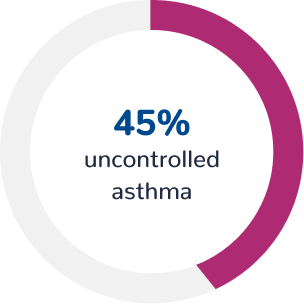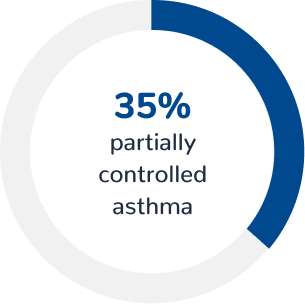Do asthma patients recognise poor asthma control?
The REALISE (Recognise Asthma and Link to Symptoms and Experience) survey-levels of asthma control across Europe1
Patients may consider their asthma to be well-controlled and mild yet in accordance to the GINA criteria they may be partially controlled or uncontrolled.2 The REALISE survey aimed to look at levels of asthma control vs the patients attitude and belief towards control across Europe.1


- REALISE survey was conducted in 2012 in asthma patients who were active on social media
- 8,000 diagnosed asthma patients aged 18 – 50
- 11 European countries
The survey highlighted that 45% of respondents had uncontrolled and 35% partially controlled asthma according to the GINA criteria.1,2
Despite this, over 80% of patients in these groups considered their asthma as controlled and more than 2/3 of patients with exacerbations requiring oral steroids did not think their asthma was serious.1
Abbreviations: GINA: Global Initiative for Asthma; REALISE: Recognise Asthma and Link to Symptoms and Experience
Did you know?3
Insufficient inspiratory effort in DPI users showed a significant association with uncontrolled asthma and risk of exacerbations. This reinforces the link between poor inhaler technique and poor asthma outcomes.3
The CRITical Inhaler mistaKes and Asthma controL (CRITIKAL) study investigated the association between specific inhaler errors and asthma outcomes using data from more than 5,000 adults with asthma.3
The CRITIKAL study found that:
- Insufficient inspiratory effort was common (made by 32%‒38% of DPI users) and was associated with uncontrolled asthma in those using Turbohaler and Diskus devices (adjusted odds ratios [95% CI, 1.30 and 1.56, respectively].3
- Insufficient inspiratory effort was significantly associated with an increased likelihood of being in the uncontrolled asthma category and was significantly associated with increased exacerbation rate (after adjustment of patient factors) among DPI users.
- In MDI users, actuation before inhalation was common (made by 24.9% of patients) and was associated with uncontrolled asthma after adjustment of patient factors.3
- The most frequent error in the MDI cohort was “inspiratory effort not slow and deep,” however this was not associated with uncontrolled asthma.3
- After adjustment by patient factors, none of the MDI errors was significantly associated with exacerbation rate.3

Abbreviations: CI: confidence interval; CRITIKAL: Critical inhaler mistakes and asthma control; DPI: dry powder inhaler; MDI: metered-dose inhaler
References
- Price D, et al. Prim Care Respir J 2014;24:14009.
- Global Initiative for Asthma (GINA). Global Strategy for Asthma Management and Prevention (Updated 3rd May 2022). Available at:
https://ginasthma.org/wp-content/uploads/2022/05/GINA-Main-Report-2022-FINAL-22-05-03-WMS.pdf Accessed 3 August 2022. - Price D, et al. J Allergy Clin Immunol Pract 2017;5(4):1071.









